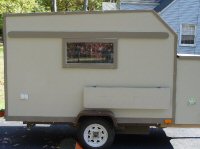TD4FREEW/CTD wrote:i take it people generally weld all the possible connection points between frame and tongue?
Interestingly, the Australians seem to recommend that transverse welds across the tongue are not made at the front crossmember - there doesn't seem to be a problem with the longitudinal welds along the tongue (ie, either side).
I think their reason is that the transverse weld just weakens the tongue at its most critical point and as most tongues that fail seem to do so with the coupler going up (or front of trailer body going down, depending on which way you're looking at it), there's no requirement for that weld under this loading.
But I've seen Australian sites say that the tongue shouldn't be welded to the front crossmember at all, which seems a bit extreme to me - I would expect this to produce 'chatter' as the tongue comes off the front crossmember (maybe only by 1/32") and then bangs back on it again.
Andrew


 It's one thing I made sure I didn't do when I made my trailer
It's one thing I made sure I didn't do when I made my trailer  Never seen any that say not to weld it at all though.
Never seen any that say not to weld it at all though.

 How long is that tongue and whats the tongue weight capacity
How long is that tongue and whats the tongue weight capacity 

